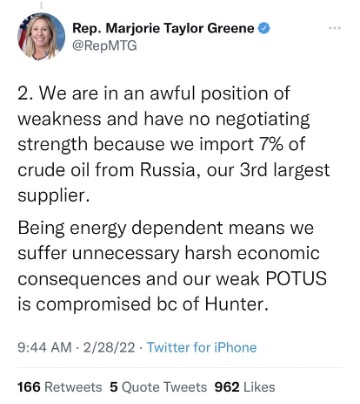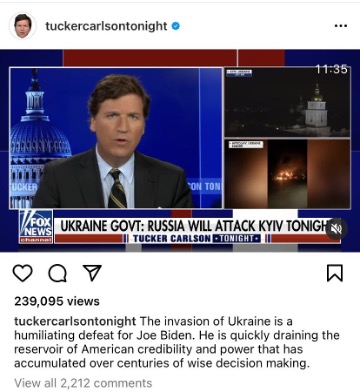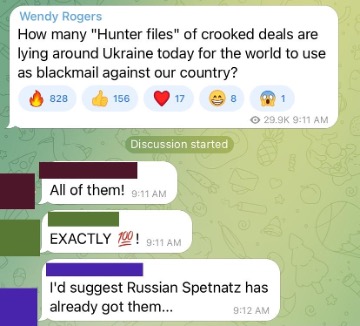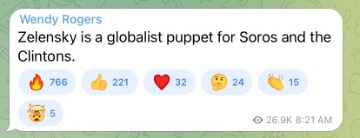After weeks of relative uncertainty, Russian President Vladimir Putin officially ordered an invasion of Ukraine on 24 February 2022, displacing residents of major Ukrainian cities and marking a major shift in the news cycle around the world. Within minutes, real-time videos of fiery skies above Kyiv, accompanied by panicked voices of on-the-ground witnesses, spread rapidly across social media.
Yet as with many significant world events, far-right groups were quick to react to the news by voicing criticisms and conspiracy theories about the crisis on both mainstream and alternative social media networks. This Insight will highlight some of the common theories espoused by those groups, as well as those shared by prominent right-wing politicians and media figures. The following sections will provide examples from multiple social networks, but with a particular focus on messages shared via Telegram, which has grown increasingly popular with the far-right.
Anti-Ukraine Sentiments
On many far-right social media channels, general criticism falls less on Putin and more on Ukraine’s government and its citizens. This is in direct contrast with the recent outpouring of support for Ukraine from President Biden, celebrities, companies, and more. The contrast is made clearer on Telegram, where the prospect of having Ukrainian refugees in the United States leads to xenophobic statements and concerns about incoming terrorists.


In other cases, feelings on Ukraine are based solely on who’s expressed support for it. For example, George Soros – a key figure demonised in many far-right conspiracy theories – posted on Twitter about standing with Ukraine. With this, those who equate Soros with evil appear to take his stance as an indicator of Ukraine being an enemy, with veiled remarks like “Soros supports Ukraine. That is all.”


Distractions & Paranoia
Several posts indicate that people in far-right groups may find the Ukraine crisis to be a mere distraction from what is happening in places like the United States – particularly when it comes to recent anti-mandate convoys, which have been competing for journalistic attention since the initial phase of the Russian invasion. These messages from convoy-centric Telegram channels highlight calls to ignore the news from abroad and stay focused on the mission at home. Some users even compare their plight to that of Ukrainians, saying that the US will “be just as bad as Ukraine” soon. This is in response to COVID mandates, which are often depicted in these spaces as tyrannical measures of government overreach.


Others take the ‘distraction’ theory a step further – particularly in QAnon groups, where Ukrainian president Volodymyr Zelenskyy is accused of being a “crisis actor” due to his past career in entertainment. This is aided by the use of the common Q catchphrase, “you are watching a movie,” as seen in the Q drop below. Not only does this tactic help support the so-called validity of Q as a legitimate figure of authority, but it may even soften the blow of the often disturbing and violent images coming out of Ukraine on social media. In other words: It is far easier to cope with the atrocities if they can be passed off as fiction.


Putin vs. Deep State
A common conspiracy theory about the ongoing crisis is rooted in the suspicion that Putin’s airstrikes are actually targeting biolabs in Ukraine, which are alleged to have been funded by the United States. While the biolab theory has since been debunked, it continues to make the rounds on far-right social media accounts.
By situating Putin as a hero, these users are better positioned to defend his actions towards Ukraine, as well as further demonise the alleged “deep state conspirators” that some believe are behind the COVID-19 pandemic. Notably, many on the right remain adamant that the COVID virus was leaked from a Wuhan lab – a theory often promoted by Donald Trump, but largely debunked due to the overwhelming evidence that it originated in a seafood market. Therefore, it can be argued that residual paranoia regarding COVID-19 has informed the far-right’s attraction to the Ukrainian biolab conspiracy theory.


Other social media users revisit anti-Soros and anti-communist sentiments to validate their support of Putin. On a Telegram channel centred around US anti-mandate convoys, a post from the account holder – which advocated for ending the war in Ukraine – stokes paranoia over “communist infiltrators” in the chat. Users once again rise to Putin’s defense, with group members praising him for “getting rid of Soros,” claiming that he “is saving mankind,” and arguing that “he has it all.”


Blaming Biden
The far-right frequently uses President Biden as a scapegoat for an array of problems both foreign and domestic, and Russia’s invasion of Ukraine is no exception. Such stances have been pushed by politicians such as Marjorie Taylor Greene, who blames the vulnerability of the US on “our weak POTUS” and refers to long-standing paranoia on the far-right related to Hunter Biden. Fox News’ Tucker Carlson echoes a similar sentiment on his Instagram page, blaming Biden for “draining the reservoir of American credibility and power.”


On Telegram, Arizona senator Wendy Rogers also references the Hunter Biden theory in reference to Ukraine. Notably, Rogers’ violent and conspiratorial rhetoric, including some hateful comments towards Zelenskyy (as seen below), recently led to her being censured by a bipartisan group of state senators.


Looking Forward
This report highlights just a few discursive themes on the far-right regarding the actions of Putin and his invasion of Ukraine, which lean overwhelmingly towards praise of Putin, hatred of Biden, and suspicion as to how the mainstream media have depicted the ongoing crisis. As the situation evolves or even worsens, reactions across the political spectrum will likely follow suit. However, we must also consider the long-term impact of these worldviews in a time when COVID and politics have already exacerbated a deep ideological divide – not just among individual countries, but around the world.
Sara Aniano is currently a Communication graduate student at Monmouth University in West Long Branch, New Jersey. Her primary research interests include QAnon, far-right ideologies, medical misinformation, and extremism on social media. Particularly, she aims to highlight Instagram’s role in the spread of conspiracy theories and its contribution to harmful offline events and violence.
